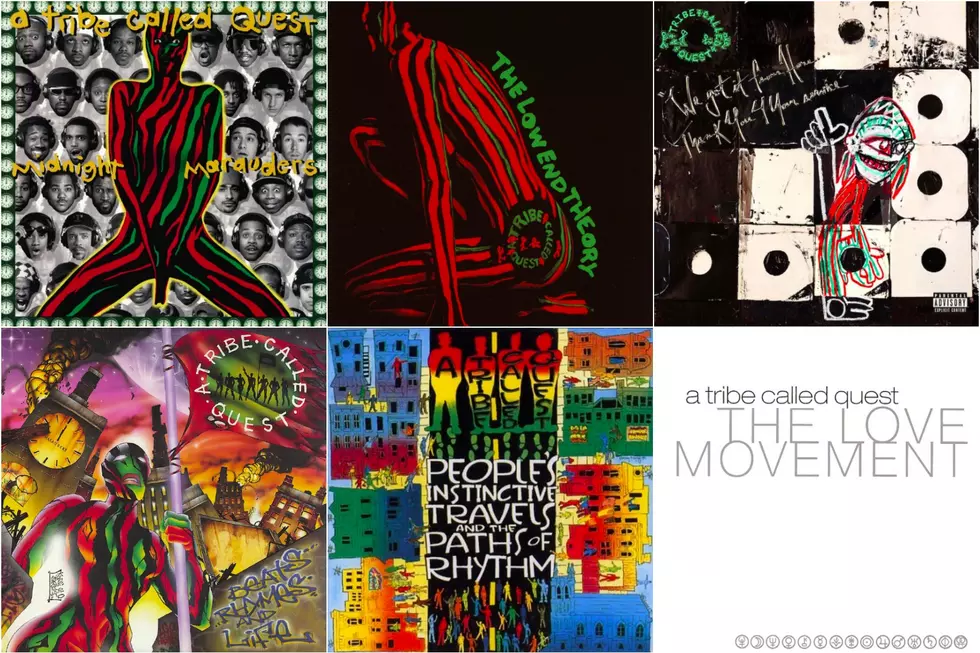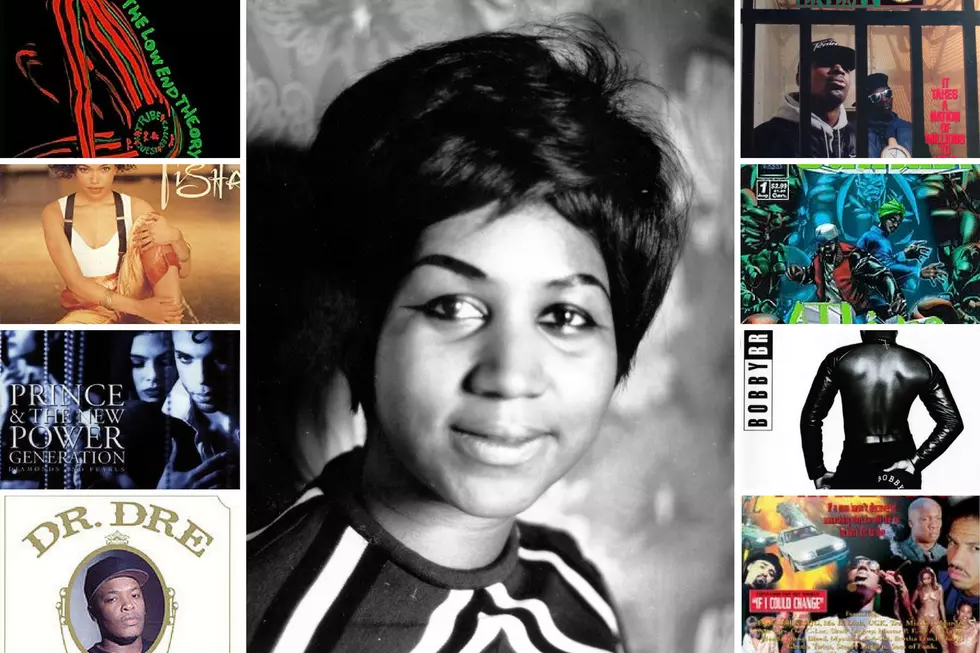
‘The Low End Theory’ Announced A Tribe Called Quest as Hip-Hop’s Foremost Auteurs
A Tribe Called Quest had opened the 1990s as the latest emerging stars of the famed Native Tongues; an artsy collective of left-of-center rap acts that had risen out of New York City in the late 1980s. As far as seminal albums, The Jungle Brothers struck first in 1988, with their acclaimed debut Straight Out the Jungle; De La Soul emerged a year later, their 3 Feet High & Rising was released to widespread critical acclaim and commercial appeal, cementing the Native Tongues, alt-rap and an up-and-comer named Q-Tip, who famously appeared alongside the JBs and De La in the video for the posse cut "Buddy." Following De La Soul's commercial breakthrough, the Jungle Brothers released their second album, Done By the Forces of Nature in 1989; another Native Tongues classic would be released at the very end of 1989, the debut album from a 19-year old emcee out of New Jersey named Queen Latifah, who released All Hail the Queen that November.
But A Tribe Called Quest had been lurking the entire time. The aforementioned Q-Tip had also appeared on The JB's albums since Straight Out the Jungle and his own crew finally got their time to shine in 1990, when Tribe dropped their critically-acclaimed debut People's Instinctive Travels and the Paths of Rhythm. The album built on De La Soul's commercial success, with hit singles like "Bonita Applebum" and "Can I Kick It?" affirming ATCQ as a top tier hip-hop act and the new stars of the Native Tongues. But no one really saw what was to come. Because in 1991, A Tribe Called Quest changed directions in a way that would reverberate throughout hip-hop for the rest of the 1990s.
On their first album, the quartet of Q-Tip, Phife Dawg, Jarobi and Ali Shaheed Muhammad had traded heavily on their oddball eccentricities; rhyming about everything from venereal diseases ("Pubic Enemy") to their favorite breakfast ("Ham 'N Eggs"). This wasn't outside of what was then-standard for the Native Tongues'--quirkiness had always been their raison d'être. And Tribe's uber-boho image was also par-for-the-course, coming on the heels of "D.A.I.S.Y. Age"-era De La Soul. But just as De La came to regret that early imagery; going so far as to metaphorically bury it on their classic second album, (1991s De La Soul Is Dead); likewise would A Tribe Called Quest abandon the daishikis and knitted caps of their debut for Starter jackets, hoodies and grounded everymanism on The Low End Theory. And musically, Q-Tip pushed their sound into jazzier, edgier sonic territory. He'd been looking to one of the biggest producers in hip-hop as an inspiration--a gangsta godfather producing classic albums out west for The World's Most Dangerous Group.
“Everybody deals with shit in a competitive way. But not in like an egregious way, how shit looks a little bit today,” explained Tip during an appearance on Shade 45's All Out Show back in 2012. “But more like one-upmanship in the music. Tryin’ to stay fresh…just keeping your eye on 'that dude.' And for me, personally, when I went in, that dude was [Dr. Dre.]”
“The group was NWA, and to me, that was the benchmark. And of course I was listening to everything else around…” Tip continued. “The bar was set very high. Musically, my main thing was Dre. That was like, trying to make something he would like and appreciate in a way. Musically.”
Tribe would convene at Battery Studios in early 1991 and get to work on the new project. And a few seconds into The Low End Theory, it's obvious that Tip was inspired to move in a more melody-driven and streamlined sound for ATCQ's second album. "Excursions" is a haunting opening track that sets the mood for the rest of The Low End Theory. Guided by a loop from "A Chant For Bu" by Art Blakey and the Jazz Messengers, Q-Tip opens the album with a classic, reflective couplet:
"Back in the days when I was a teenager, before I had status and before I had a pager. You could find The Abstract listening to hip-hop. My Pops used to say it reminded him of bebop."
Things move in cycles--as Tip explains; and with that, Tribe made it clear that jazz was a clear forefather to their new brand of hip-hop expansionism. This was a musical journey into the future through the past; a sonic reimagining for a group that had previously seemed all-too-similar to it's Native Tongues kin. The Jungle Brothers and De La Soul had flipped jazz samples and seemed to embody the creative spirit of the genre, but Tribe was the first to expertly channel the mood of jazz onto rap records in a way that sounded both classic and fresh. Tribe was going somewhere else entirely on this new album.
The gorgeous double bass played by Ron Carter provides both bottom and a countermelody on the sublime "Verses From the Abstract," a standout track also blessed with a great vocal appearance from the inimitable Vinia Mojica. Minimalistic grooves center everything on the album--with lyrically interplay out front. Whether literally jazz or not, the samples all sound fluid and organic; "Skypager" features an inspired flip of Sly & the Family Stone's "Advice," and Tip and Phife rhyming about the then-current pager fad of the early 1990s and it segues into the effervescent "What," a giddy stream-of-conscious rhyme by Q-Tip that features some of the most fun wordplay on the album and one of the few glimpses of People's Instinctive Travels...-style quirkiness from Tip, all over a sample of "Uncle Willie's Dream" by Paul Humphrey. It all feels like jazz.
“There were a couple of other groups that were sampling jazz at that time,” recalled Ali Shaheed Muhammd in 2011. “Gang Starr, Pete Rock and C.L. Smooth, Main Source, and even prior to us (at that point, we were the newer generation of hip hop), you had Stetsasonic, who called themselves 'The Hip Hop Band.' This is before The Roots, but they were sampling jazz, and they even had a song called 'Talking All That Jazz', which was a very historic moment in hip hop, [because] certain artists were not embracing what the artists were doing at that time by sampling jazz. It was frowned upon. You have Marley Marl, who was also a legendary, iconic producer, and someone whose footsteps we wanted to follow; and he sampled soul and jazz. So, there were a couple of people who introduced it, but I think the way that we delivered it was in such a way that had not really been done... in that capacity, in that manner, in that sound.”
Famed producer/engineer Bob Power did brilliant work on The Low End Theory, and he felt that a key to it's unique sound was the way Q-Tip and Ali approached sampling.
“The Low End Theory was an interesting record; in a way, it was the Sgt. Pepper’s of hip-hop," Power would tell Uproxx in 2011. "It’s a record that changed the way that people thought about putting music together. I’m not a big hip-hop historian; I just know the stuff that I worked on. Until that point, when people used samples on records, it was pretty much one loop that played throughout. With The Low End Theory, and People’s Instinctive Travels, to a lesser extent, Q-Tip and Ali Shaheed were at the leading edge of a new wave where people started making elaborate musical constructions out of samples from different places that would not, and in many ways, could not, have been played by regular players."
Along with that emphasis on minimalism and groove and a more pronounced jazz sensibility, the most notable and noted shift on The Low End Theory is the presence of the late Phife Dawg. The unexpected departure of Jarobi, (he left the group to pursue culinary school in early 1991), meant that Phife didn't have his best friend in the group and that he would be an odd man out with Q-Tip and Ali handling so much of the production duties and serving as Tribe's creative anchors. Early on, the sports-and-streets-obsessed Phife had been only marginally interested in A Tribe Called Quest. But that was about to change.
"A couple of months before we started workin' on Low End..., I just happened to run into Q-Tip on the train leaving from Queens going into Manhattan," Phife recalled in a 2015 interview with Rolling Stone. "He was like, 'Yo, I'm about to start recording this next album. I want you on a couple of songs, but you have to take it serious, blah, blah, blah.' So I was like, 'Aiight, I feel you' and I took that into consideration along with the last couple of shows we did for that first album. I saw how fruitful things could get and I said, 'Okay, I made up my mind that this is what I want to do.' I wanted to take care of my family, so it was all systems go, for real."
Phife may have only appeared on three songs on People's Instinctive Travels..., but he would become the breakout star of The Low End Theory; a sort of lyrically-jumpy Joe Pesci to Q-Tip's more cool and subdued Deniro. The album features several classic moments from Tribe's diminutive sparkplug; including the classic opening verses of "Buggin' Out" and "Scenario," and his (mostly) solo showcase "Butter."
And all over The Low End Theory, the chemistry and interplay between Phife and Tip is the most effortless it would ever sound on record; brilliantly showcased on "Jazz (We've Got)" and culminating on the immaculate "Check the Rhime." Those two singles, in particular: encapsulate the feel and mood of The Low End Theory. Both are jazzy in spirit but remain staunchly hip-hop in attitude, aggressively laid-back in a way that no one had ever perfected on tracks quite like Q-Tip does on this album. "Jazz (We've Got)" was built from a Pete Rock loop of "Green Dolphin Street" by Jimmy McGriff; and Tip's shrewd repurposing of Grant Green's "Down Here On the Ground" makes for one of Tribe's greatest moments on record; the sublime "Vibes 'n Stuff." Brand Nubian and Diamond D make a notable guest appearance on the pointed "Show Business," a song that flips everything from The Fatback Band to Aretha's "Rock Steady" to James Brown and Ferrante & Teicher; and a song that features pointed observations from about the always-shady industry. But "Show Business" was born of one of the uglier moments in Tribe's recorded history.
A late addition to The Low End Theory, "Show Business" was originally conceived as "Georgie Porgie," a homophobic posse cut that Jive Records wanted removed from the original album. "Show Business" was the group's retort to their label's decision to remove the song; with a noteworthy absence from Brand Nubian's Grand Puba, who reportedly refused to re-record the track and stayed off the record in protest. While the bigoted "Georgie Porgie" never officially made it onto the album, "The Infamous Date Rape" did; a careless song that is both flippant and misogynistic in addressing the subject in its title. There is no real compassion for women here, with Phife and Tip instead centering male victimization and frustration. The song inadvertently stands as a reminder that even the most creative and intuitive men could stand a re-education on consent and empathy, among other things. .
Of course, the album closer "Scenario" has become one of A Tribe Called Quest's most beloved songs, and one of the most praised posse cuts of all time. Featuring a guest appearance from Leaders of the New School, the song became famous as the moment that Busta Rhymes emerged as a star within LONS, setting up a breakout solo career that would catch fire in the mid-1990s.
“There was electricity in the air that night," recalled Power when reflecting on the recording session for "Scenario." "What you hear is really what went down in the studio: all the MCs feeding off each other, one after another. To get the best, sonically, but also to keep the flow going, I set up five different mics in the booth. Each MC would come in, and I’d ask, 'Say the same thing on each one.' They’d go through the mics; I’d say, “number 4,” and we’d cut the vocal.
“Everyone did their rhyme and then Busta came in with one of the great recorded MC performances of all time: 'Oh my God! Oh my God!' I remember being blown away by the pure, visceral energy, and Busta’s feature raised the bar considerably that night."
And when it was released on September 24, 1991, The Low End Theory raised the bar for A Tribe Called Quest. Widely hailed upon release, landing a coveted 5 mic rating from The Source and winding up on several "Best of" lists at the end of that year. And memorable videos for "Check the Rhime," "Jazz (We've Got)" and "Scenario" would make A Tribe Called Quest fixtures on MTV and BET. The musical impact was also immediate: over the next two years, "alternative" rap acts like Pharcyde, Digable Planets and Arrested Development would all enjoy significant mainstream success; and jazz rap releases from artists as diverse as The Dream Warriors, Quincy Jones and Miles Davis would become the norm; with Brandford Marsalis collaborating with Guru of Gang Starr on the Buckshot Lafonque project and Herbie Hancock releasing Dis Is da Drum in 1994. Whether or not the movement began with A Tribe Called Quest is highly debatable, but it can't be denied that The Low End Theory played a significant role in mainstreaming the aesthetic.
It should also be noted that, much like Nirvana's Nevermind (also released on September 24, 1991), The Low End Theory reverberated throughout hip-hop and R&B for years to come; forging an "artsy" image and mood that would inform the rise of neo-soul in the mid-90s with artists like D'Angelo and Erykah Badu; as well as late 90s hip-hop artists like Black Star and Slum Village. In the same way that "Smells Like Teen Spirit," made the angsty outsiders the cool kids of rock, "Check the Rhime" made the artsy nerd rap kids the new normal.
Of course, A Tribe Called Quest would get even bigger after 1993s Midnight Marauders, only to slowly implode over the course of their final two albums, Beats Rhymes & Life and The Love Movement. The relationship between Q-Tip and Phife would progressively sour and the group would officially disband in 1998, with Q-Tip pursuing a successful-but-sporadic solo career. The next 18 years would see ATCQ reuniting for performances, anniversaries and the acclaimed 2011 documentary Beats Rhymes & Life: The Travels of A Tribe Called Quest. Sadly, on March 22, 2016, Phife Dawg died at age 45 after a lengthy battle with diabetes.
A Tribe Called Quest's legacy is vast and diverse. It can't be reduced to one album; but there's no question that The Low End Theory looms large in their history. It's a vessel that communicates Black music's past, present and future; and remains a high-water mark for hip-hop minimalism, creativity and nuance. And in bringing those seemingly-disparate worlds of hip-hop and jazz together, Tribe found a commonality for a generation to tap into.
“I just felt like a conduit… like I wasn’t even conscious, shit was just happening,” recalled Q-Tip to VH1 in 2011. “It was just like energy that we didn’t even plan on, we just got in and...
"It was almost just like how a band jams.”
More From TheBoombox









